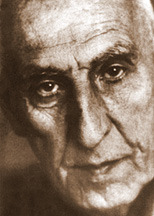The history of Iranian student political protest began in 1941 with the abdication of Reza Shah and occupation of Iran by the allied forces. At this time, Tehran University became the main base for the student campaign against authoritarianism and foreign interference.
 During the nationalist movement led by Dr. Mohammad Mossadegh, student activists throughout the country played an important role in support of his agenda. After the August 1953 coup and with the start of the new academic year, Tehran University students resumed their political activism, now directed against the “coup regime” and the restoration of diplomatic ties with Britain.
During the nationalist movement led by Dr. Mohammad Mossadegh, student activists throughout the country played an important role in support of his agenda. After the August 1953 coup and with the start of the new academic year, Tehran University students resumed their political activism, now directed against the “coup regime” and the restoration of diplomatic ties with Britain.
Within a short time, the Pahlavi regime essentially silenced the forces of opposition, with only sporadic expression of public angst against the Shah and Zahedi’s government seen in the bazaar and throughout the city. When Mossadegh’s trial in military court began, Tehran University students held a large demonstration against the proceedings on university grounds. On that day, for the first time, the sanctity of campus life was broken when the Shah’s troops confronted the protesting students. The following month, in an encounter with Shah’s security forces, a number of students were injured and many others were arrested.
 By December 1953, three months after the coup, Tehran was firmly under martial law, with tanks and troops stationed all around the city. On December 9, Eisenhower’s Vice President Richard Nixon visited Tehran to greet the newly installed regime.
By December 1953, three months after the coup, Tehran was firmly under martial law, with tanks and troops stationed all around the city. On December 9, Eisenhower’s Vice President Richard Nixon visited Tehran to greet the newly installed regime.
Two days prior, in protest of Nixon’s forthcoming visit and the newly announced resumption of relations with Britain, students staged a demonstration on the university campus. The Shah’s troops, recently stationed there to crackdown on protesters, clashed with the defiant crowd, who ran into the building. Subsequently, army commandos ordered to ‘shoot to kill’ fatally wounded three students in the corridor of the engineering school, while several more were badly wounded.
In memory of Mostafa Bozorgnia, Ahmad Ghandchi, and Mehdi Shariat-Razavi — the three students murdered on that day — December 7, 1953 (16 Azar 1332) has since become known as "Student Day". Each year during Mohammad Reza Shah’s rule, he cracked down upon participants in the anniversary observance of Student Day.
After the 1979 revolution, the established Islamic government used this annual event as an expression of the nation’s strong disapproval of U.S. policy. However, it has come to represent more of a threat to their own position instead. Recent reports from Iran point to the worsening of the government’s stance against free speech, with news of the arrest of scores of students throughout the country to stifle the expected "Student Day" protest on December 7, 2009.
The Islamic Republic News Agency [IRNA] quotes Ayatollah Ahmad Jannati cautioning Iranians to keep the dissent flowing outward rather than inward — or else. “[W]ar against the system will cost [protesters] dearly”, threatened Jannati. Tehran’s police chief Azizallah Rajabzadeh made similar remarks warning against “unrest”. “December 7th is a day to fight arrogant powers”, said Rajabzadeh in a Press TV report, presumably meaning Western governments and not the Islamic regime itself.
Two years earlier, in December 2007, the same state funded media, Press TV, reported more favorably of the anniversary protests. “Iranian universities have always been an important platform for people’s emancipation, freedom, and a humane society”, said the article non-ironically.
The International Campaign for Human Rights in Iran has called for the immediate release of all students who have been detained for exercising their rights to freedom of expression and association. Several prominent student leaders have already been either arrested or summoned before the revolutionary court. One arrested student leader is Milad Asadi, who in a recent interview defended the “students’ collective rights, our right to study, our right to free expression, the freedom of association and assembly, which all the students all around the world are enjoying.” The police have warned that the Student Day ceremonies will only be held in the universities with valid permission, and gathering anywhere else in the city will be punished severely.
We stand in solidarity with the students in defense of their rights and the rights of all people in Iran.
The Mossadegh Project
December 6, 2009
Related links:
University Protests in Iran Continue (16 Azar, December 2010)
30 Tir Anniversary Protest of Islamic Regime
The Clerics’ Role in the 1953 Coup (MOSSADEGH, Islam and Ayatollahs)
MOSSADEGH t-shirts — “If I sit silently, I have sinned”






